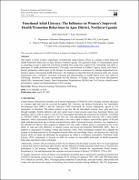Functional Adult Literacy: The Influence on Women’s Improved Health Promotion Behaviours in Apac District, Northern-Uganda
Abstract
This article is about women’s experiences of Functional Adult Literacy (FAL) as a means to their improved
Health Promotion Behaviours in Apac District, Northern Uganda. The qualitative study of 29 participants aimed
at examining women’s improved well-being resulting from using their acquired FAL knowledge and skills to
participate in health promotion behaviours. The study was informed by Kabeer’s agency theory and Freire’s
literacy perspective which argue on the element of conscientisation or awareness by making marginalised nonliterate’s
agents of promoting health behaviours. The findings revealed that from the practical skills, the women
experienced more confidence, increased awareness and understanding on health-related issues and improved
well-being. Therefore, the study recommends that the Ministry of Gender, Labour and Social Development
(MoGLSD), International Donors, Non-Governmental Organisations (NGOs) and Civil Society should ensure
prioritisation, support and implementation of FAL training.
Collections
- Research Articles [29]

